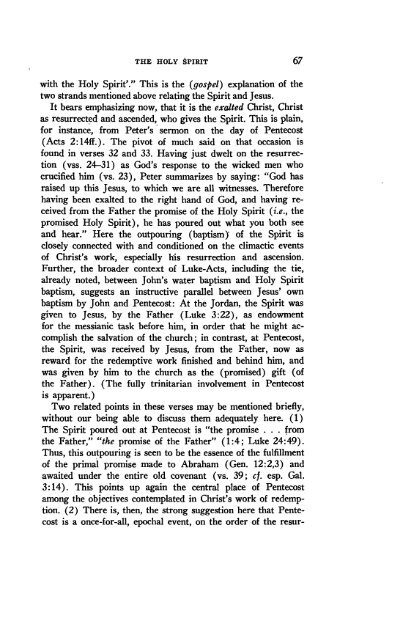NEW TESTAMENT THEOLOGY
Issues%20in%20New%20Testament%20Theology
Issues%20in%20New%20Testament%20Theology
You also want an ePaper? Increase the reach of your titles
YUMPU automatically turns print PDFs into web optimized ePapers that Google loves.
THE HOLY SPIRIT 67<br />
with the Holy Spirit'." This is the (gospel) explanation of the<br />
two strands mentioned above relating the Spirit and Jesus.<br />
It bears emphasizing now, that it is the exalted Christ, Christ<br />
as resurrected and ascended, who gives the Spirit. This is plain,<br />
for instance, from Peter's sermon on the day of Pentecost<br />
(Acts 2:14ff.). The pivot of much said on that occasion is<br />
found in verses 32 and 33. Having just dwelt on the resurrection<br />
(vss. 24-31) as God's response to the wicked men who<br />
crucified him (vs. 23), Peter summarizes by saying: "God has<br />
raised up this Jesus, to which we are all witnesses. Therefore<br />
having been exalted to the right hand of God, and having received<br />
from the Father the promise of the Holy Spirit (i.e., the<br />
promised Holy Spirit), he has poured out what you both see<br />
and hear." Here the outpouring (baptism) of the Spirit is<br />
closely connected with and conditioned on the climactic events<br />
of Christ's work, especially his resurrection and ascension.<br />
Further, the broader context of Luke-Acts, including the tie,<br />
already noted, between John's water baptism and Holy Spirit<br />
baptism, suggests an instructive parallel between Jesus' own<br />
baptism by John and Pentecost: At the Jordan, the Spirit was<br />
given to Jesus, by the Father (Luke 3:22), as endowment<br />
for the messianic task before him, in order that he might accomplish<br />
the salvation of the church; in contrast, at Pentecost,<br />
the Spirit, was received by Jesus, from the Father, now as<br />
reward for the redemptive work finished and behind him, and<br />
was given by him to the church as the (promised) gift (of<br />
the Father). (The fully trinitarian involvement in Pentecost<br />
is apparent.)<br />
Two related points in these verses may be mentioned briefly,<br />
without our being able to discuss them adequately here. (1)<br />
The Spirit poured out at Pentecost is "the promise . . . from<br />
the Father," (t the promise of the Father" (1:4; Luke 24:49).<br />
Thus, this outpouring is seen to be the essence of the fulfillment<br />
of the primal promise made to Abraham (Gen. 12:2,3) and<br />
awaited under the entire old covenant (vs. 39; cf. esp. Gal.<br />
3:14). This points up again the central place of Pentecost<br />
among the objectives contemplated in Christ's work of redemption.<br />
(2) There is, then, the strong suggestion here that Pentecost<br />
is a once-for-all, epochal event, on the order of the resur-


